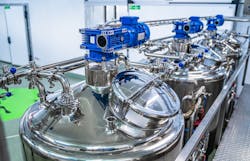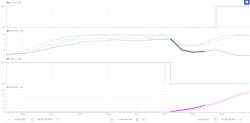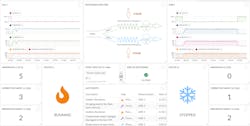Enhancing sustainability in the food and beverage industry with operational data
Consumer demands for sustainable products are helping to shape the future of the food and beverage processing industry. Buyers are seeking environmentally friendly and socially responsible products made from sustainable practices that start at the farm and extend beyond the factory floor. Companies in every part of the food and beverage industry — from manufacturers of ingredients to those that make market-ready products — must find ways to increase efficiency, cut waste and meet global food demands.
The industry also is experiencing increased pressure from governments and regulatory boards to improve their environmental stewardship while meeting higher global food consumption demand. Companies that do not address these concerns risk regulatory action and increased public scrutiny. They also may fall out of favor with consumers and investors if they do not meet these challenges.
One of the ways that food and beverage processors can meet changing global demands is to search for information hidden inside operational data. When properly leveraged, this sensor-generated data provides insights on asset performance and offers opportunities to improve production while achieving sustainability goals.
Details in the data
A 2022 research report from Deloitte said that food and beverage companies are aware of growing concerns from consumers and government officials. The report also notes that manufacturing companies in the food and beverage industry are investing heavily in technology to tame those fears.
In the age of Industry 4.0, smart factories use this technology to capture and store operational data. This data contains information about process behavior that can be used to solve production anomalies and increase sustainability while reducing waste and costs. Companies that invest in advanced industrial analytics software to explore operational data will be positioned better to compete in the rapidly evolving food and beverage industry, according to the report.
By leveraging clues hidden in operational data, the food and beverage industry can track its environmental impact and assess the efficiency of its manufacturing processes. Companies can reduce their environmental footprint and accelerate their efforts to achieve sustainability goals.
With industrial analytics, engineers in the food and beverage processing industry can:
- Monitor process behavior and performance to determine the right time to schedule maintenance, which can prevent damaged assets or unplanned shutdowns.
- Find processes that are energy-intensive, and discover ways to reduce energy use and greenhouse gas emissions.
- Save freshwater use and decide if process water can be recycled for the future.
- Measure and determine the best way to control the carbon footprint of operations and production.
- Reduce or eliminate production waste.
In short, food and beverage processors using advanced industrial analytics can save time and money while meeting production and sustainability goals.
Solving shutdowns to decrease waste
In one example, a food processing company saved a significant amount of money per year after analyzing operational data to learn why a new pasteurization unit periodically shut down. The company had installed the new unit for infant cereal production because the old unit was creating production bottlenecks. However, the periodic shutdowns led to increased production waste and about two hours of lost time.
To find the root cause of the shutdowns, engineers used a data-driven approach with the help of advanced industrial analytics software. First, they extracted data from their historian and loaded it into the software to visualize trends of the variables associated with the pasteurization unit. This allowed them to see what parameters might be causing the unit to fail. Engineers then conducted value-based and similarity searches to retrieve all the periods when the pasteurization unit had shut down unexpectedly.
After comparing different shutdowns, engineers determined that the pressure in Line 1 was falling below 1.5 bars when Line 2 was started (shown in Figure 1). The pressure drop lasted for 30 seconds before Line 1 shut down. However, the event only occurred when the general pressure of the main pipe fell below 5 bars.
With this information, engineers determined that the automatic shutdown feature on the pasteurization unit tripped too soon after a pressure drop. They adjusted the automatic shutdown to occur only when the pressure dropped to 1.8 bars for at least 45 seconds. Engineers also increased the pressure automatically to 7 bars for one minute whenever Line 2 was started and while Line 1 was already running.
Engineers also created a dashboard (shown in Figure 2) to monitor other areas of the pasteurization unit for potential improvements. This dashboard allowed them to see when the maximum level was reached in a tank, for example. In addition to saving money by solving the unexpected shutdowns, engineers improved asset performance and met corporate sustainability goals. The adjustments resulted in an increased production of 1-2% and a decrease in waste of 5.4%.
A demand for increased global food production must be balanced with the need to achieve sustainability goals. Companies in the food and beverage processing industry that invest in modern technologies, such as advanced industrial analytics, will find themselves in a better position to be good environmental stewards while increasing production to match growing needs.
Leveraging operational data leads to opportunities to decrease waste, save energy and reduce water usage. Not only can operational data provide answers to challenging business questions, it also can help the food and beverage industry make a positive impact on the world and shape a better future for all.
Pablo Sánchez is a Data Analytics Engineer at TrendMiner. He holds a bachelor’s in chemical engineering from the University of Cantabria and a master’s from the University of The Basque Country. Prior to joining TrendMiner, Pablo was a Production Engineer and digitalization specialist at Nestlé.
TrendMiner




